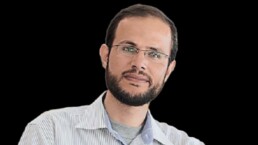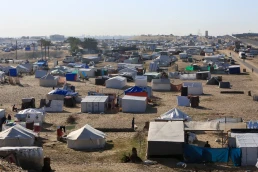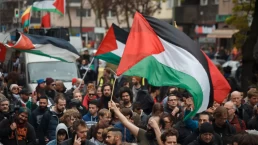The professor at University of Gaza and co-founder of “We are Not Numbers” refused to evacuate northern Gaza as demanded by Israelis and continued to report about the Palestinian resilience during the war
Dr. Refaat Alareer a writer, an activist, and a poet from Gaza was killed with six other family members in an Israeli airstrike in Gaza city on Wednesday, December 6. He was killed with his brother, sister and four of her children when an Israeli bomb hit Refaat’s sister’s house in Gaza City.

Alareer was the professor of English literature at the Islamic University of Gaza. He was a regular contributor for the Electronic Intifada, an online media organization focused on the situation on the ground across Historic Palestine.
Prof. Refaat was also the co-founder of “We Are Not Numbers” a project launched in Gaza following the 2014 Israeli attacks. The project mentors and supports the young writers in Gaza to tell their stories to the world.
Refaat edited an anthology Gaza Writes Back: Short stories from Young Writers in Gaza, Palestine in 2014 and co-edited Gaza Unsilenced with Laila El Haddad in 2015.
He and his family members had refused to evacuate northern Gaza as demanded by the Israelis before their ground offensive in late October and decided to stay back in the territory targeted by relentless Israeli airstrikes.
Over 17,000 Palestinians have been killed and over 46,000 have been injured in the Israeli attacks so far. Almost 1.9 million of 2.2 million Palestinians in Gaza have been displaced in these attacks.
Living amidst the intense bombings in Gaza City, on December 4 Refaat had written on his page on X, “I wish I were a freedom fighter so I die fighting back those invading Israeli genocidal maniacs invading my neighborhood and city.”
Refaat had already lost 26 members of his family to Israeli attacks even pre-dating the 2023 war on Gaza. One of his brothers was killed in an Israeli airstrike at his home in 2014 which had marked him deeply.
At the time in Electronic Intifada Refaat wrote, “we now live at a time in Palestine when a son lost, two kids orphaned, a young wife widowed must be compared to those who have lost ten or twenty family members at once. There is a clear attempt to ethnically cleanse Palestine, to make us leave and never come back.”
Alareer harshly critiqued the governments of global north countries which have repeatedly failed to take meaningful action to stop Israel’s genocidal attacks against Palestinians and even work to trivialize Israeli crimes. He blamed the US and the Democratic Party in particular for their support to Israeli genocide in Gaza.
However, he was full of hope about Palestinians’ resilience and believed that the occupation will be defeated and all its “barbarity and murder of people in Gaza and to sever the connections between people and people, and between people and land and between people and memories will never succeed.”
Alareer was clear about the power of the stories and encouraged the young people to continue to tell their stories to the world as one of the ways to fight back the occupation.
“It shall pass, I keep hoping, It shall pass, I keep saying. Sometimes I mean it. Sometimes I don’t. And as Gaza keeps gasping for life, we struggle for it to pass, we have no choice but to fight back and tell her stories. For Palestine,” Refaat wrote in his contribution in the book Light in Gaza: Writing Born of Fire (2022) edited by Jehad Abusalim and published by Haymarket Books.
“If I must die, let it bring hope, let it be a tale” he wrote in a poem published on X on November 1.
Recent Posts
Why Are Democratic Lawmakers Still Meeting With Netanyahu?
July 12, 2025
Take Action Now Pictures show Democrats like Chuck Schumer standing next to Netanyahu, smiling.By Sharon Zhang, Truthout A bipartisan group of…
Stop Israel’s Dystopian “Humanitarian City” Plan—Before It’s Too Late
July 11, 2025
Take Action Now For the past 20 months, the world has watched—and largely enabled—a genocidal campaign in Gaza. Over 55,000 Palestinians have been…
The “Liberal” International Order Is Criminalizing Palestine Protests
July 11, 2025
Take Action Now As Western governments repress Palestine solidarity and enable Israel’s impunity, the “liberal international order” is no longer…
Politicians Are Betraying Gen Z On Climate
July 10, 2025
Take Action Now While Gen-Zers thrift, knit, crochet, and find other ways to reduce our footprints, Trump and the GOP are greenlighting more climate…




